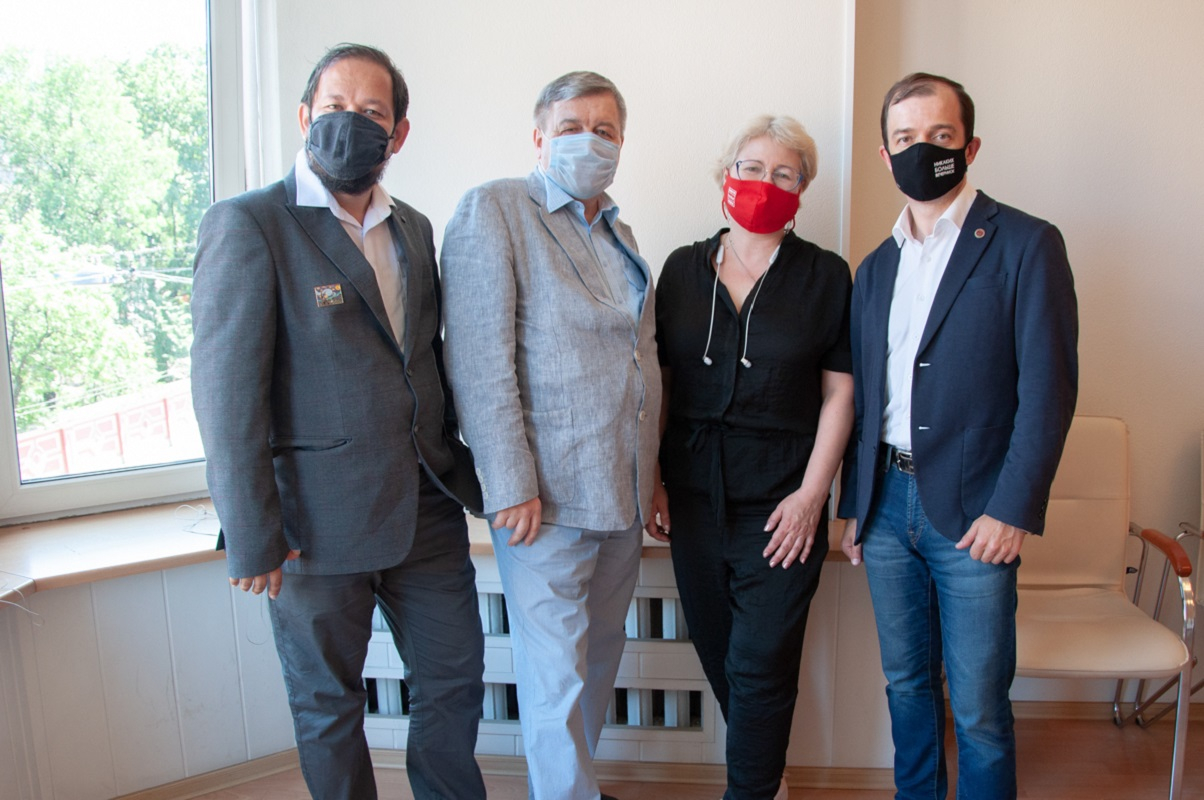New digital ethics and journalism education: St Petersburg University opens the 60th forum ‘Media in the modern world. St Petersburg readings’

The 60th International scientific conference ‘Media in the modern world. St Petersburg readings’ has started at St Petersburg University.
The forum unites three major events: academic meetings and discussions as part of the main programme, and two conferences – ‘Strategic communications in business and politics’ and ‘Language in the coordinates of mass media’. Earlier, in April, under the aegis of the forum there was held an international expert conference Comparative Media Studies In Today’s World (CMSTW’2021).
The event opened with the Neva prize award ceremony. This prize was established by St Petersburg University to: encourage research in the field of journalism and mass communications; increase the level of methodological and academic publications on the issues of mass media; and reward specialists for their outstanding achievements in journalism research and education.
The Prize winners were:
- In the category ‘Theory’ – Airat Bik-Bulatov, Associate Professor in the Department of National and Global Media of the Higher School of Journalism and Media Communications at Kazan Federal University
- In the category ‘Enlightment’ – Ivan Pechishchev, Associate Professor in the Department of Journalism and Mass Communications at Perm State University
- In the category ‘Recognition’ — Sergei Ilchenko, Professor in the Department of TV and Radio Journalism at St Petersburg University, and Editor-in-Chief of the ‘Cultural Petersburg’ newspaper
- In a special category ‘For the contribution into development of international journalism education’ – Zhang Huiqin, Professor, Academic Supervisor of the double degree master’s programme ‘Professional Speech Activity in Mass Media’ (St Petersburg University and the Beijing International Studies University (BISU))
The plenary meeting was opened with a presentation ‘Journalism: from proletariat dictatorship to artificial intelligence dictatorship’ that was given by Director of the High School of Journalism and Mass Communication Anatoly Puyu and Head of the Department of Digital Media Communications Kamilla Nigmatullina. The presentation was dedicated to the 75th anniversary of journalism education at the University that is celebrated this year.
During the main part of the presentation the speakers tried to answer the question ‘What role does university journalism education play in the new digital media landscape?’ For example, they touched upon the issue of the place of artificial intelligence in journalism and of replacement of real authors by technologies. According to Anatoly Puyu, artificial intelligence gives a wide range of tools from analytics and content generating to distribution of content and interaction with the audience. ‘However, there are certain concerns about credibility of such automated news. The problem is that algorithms of AI are precise and devoid of subjectivity or attempts to influence the audience’, said Professor Puyu. The key problem is developing new digital ethics. ‘It begs the question: What degree of legal and moral responsibility would be held by owners and staff of media companies for materials that are published by AI? And how will it be regulated?’ pointed out Anatoly Puyu. Also, he said that the level of individual responsibility is decreasing, whereas the level of responsibility of media companies is increasing.
The importance of the University education will only increase. In the future the profession of a journalist will consist of classic competences, digital skills and ethics. The good news is that these skills will be taught only at universities.
Anatoly Puyu, Director of the High School of Journalism and Mass Communication at St Petersburg University
Kamilla Nigmatullina, Associate Professor at St Petersburg University, picked up the topic of the future of higher education in journalism and mass communications. ‘Our comfort zone has expanded from humanities to complex disciplinary spheres which include knowledge of communication, language, society, technologies. It is impossible to think about genres and technique of speech separately from social and digital context. Also, you cannot transfer educational principles from offline to online education as well as traditional content to digital platforms,’ said Kamilla Nigmatullina. ‘We understand, that we cannot and should not teach most of applied subjects, for example, targeting in social media, development of mobile applications, 3D animation.’
The aim of the University is not to drill endless technical skills, but to comprehend the reality, to point at strategically important areas and work out individual professional development paths. In this sense, teachers today are more mentors or coaches.
Kamilla Nigmatullina, Head of the Department of Digital Media Communications at St Petersburg University
According to Kamilla Nigmatullina, the format of students mentoring was tested and tried out at the master’s programme ‘Media texts in mass communications’ which was supported by Vladimir Potatin Foundation. Its basic principles are as follows: supervision of students projects by mentors; constant feedback from the supervisor of the programme and independent consultants; testing public presentation skills during hackathons and as part of projects; engaging students in teaching and creating methodological materials for the programme; and developing their reporting skills.
Ivan Pechishchev, Associate Professor at Perm State University and the laureate of the Neva prize 2021, suggested discussing the prospects of higher education. During his presentation, he spoke about transformation of competence models of a university teacher during the pandemic. According to the speaker, today academic expertise and knowledge in the sphere of pedagogy and IT is not enough. A teacher should be able to create an educational environment not only online, but also in class. Teachers have to combine multiple roles at work. Ivan Pechishchev underlined that despite this fact, none of the roles is connected with knowledge transfer directly, they all are connected with organisation of various activities, supporting and directing students.
Natalia Vlasova, last year laureate of the Neva prize, Director of the Foundation for Independent Radio Broadcasting, gave a presentation ‘Professional competences of a graduate journalist: an employer’s point of view’, that is dedicated to ‘Vmeste media’ (or Media Together) festivals in different regions of Russia.

